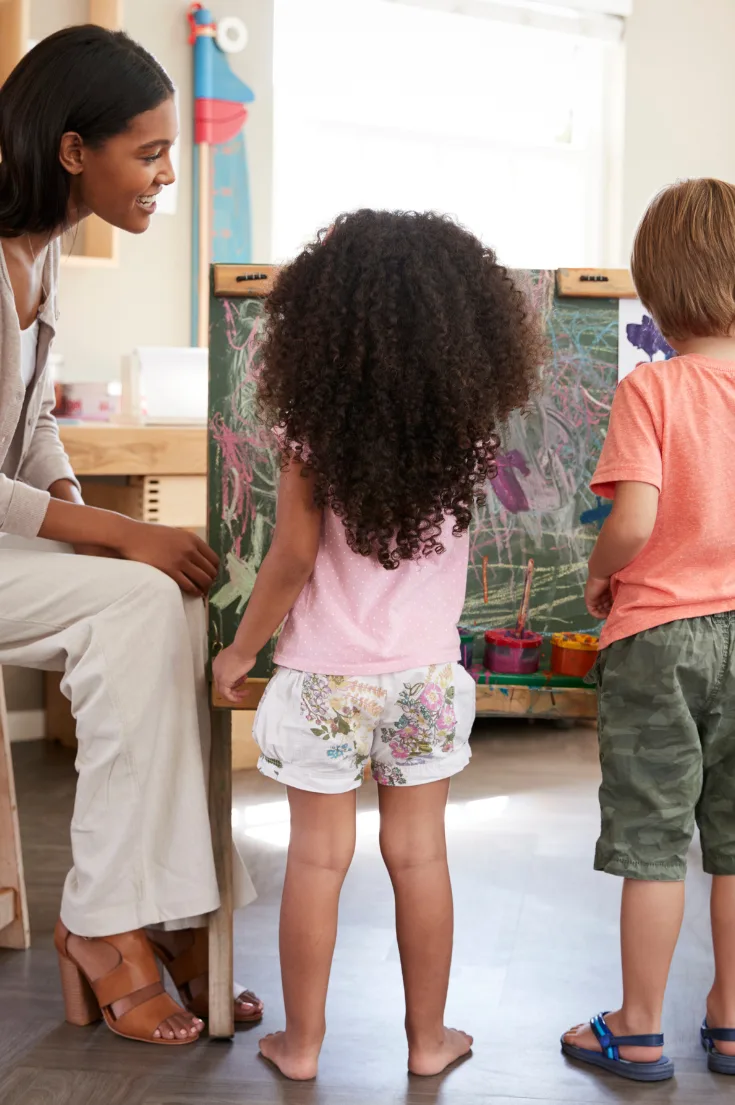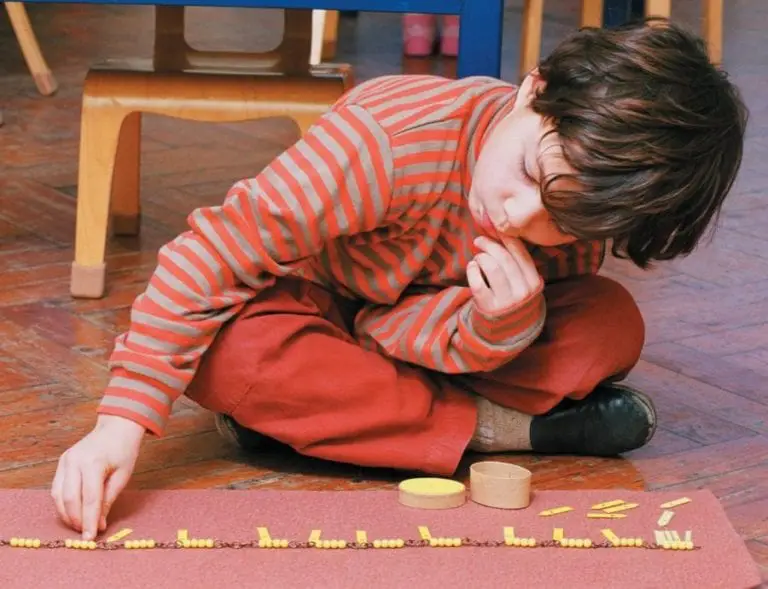If you’re a parent, Montessori might be on your radar as a potential educational approach for your child. But what are the pros and cons the Montessori method? In this post, we’ll take a look at some of the critical considerations.
Whether you’re thinking about enrolling your child in a Montessori school or considering using some of the methods in your homeschooling, it’s important to understand what Montessori is all about.

There’s a lot of buzz about the Montessori Method of education. Proponents claim that it leads to better outcomes for children, while detractors say that the approach is too rigid and lacks structure. So, what’s the truth? Let’s take a look at some essential pros and cons of the Montessori method.
If your young child is almost ready to enroll in a school, think about comparing Montessori versus traditional preschool programs. This decision could have a long-term impact on many aspects of a youngster’s life, so it’s vital to conduct plenty of research. Our in-depth look at Montessori pros and cons can help you make the right choice:

Have you been trying to determine if a Montessori education is right for your child? It is a big deal to choose a private school over a traditional school. So, do you choose a conventional school or explore Montessori? You’re in luck – this post outlines the key Montessori pros and cons.

Pros and Cons of Montessori Method
Montessori is a lifestyle, not only a method of education. Thus, before committing to Montessori, decide whether you will fully embrace the lifestyle and are willing to make changes to your environment and possibly your parenting approach in order to help your child develop his whole self.
The Montessori Pros
There are many positive aspects of Montessori education and Montessori preschools are indeed a unique & beautiful thing.
- Firstly, children become self-motivated lifelong learners. Children work either individually or in small groups at their level. They gain confidence and a love for learning that stems from the freedom to choose.
- In addition, Montessori teachers evaluate each child and his or her individual needs. Each child is seen as a singular entity. He or she has the ability to work at his or her own pace. You will not find standardized testing in Montessori classrooms.
- Next, children are presented with a broader range of knowledge about the world around them. They explore topics in geography, history, and science holistically.
- Children learn grace and courtesy skills. Through role-play, children learn how to handle real-life situations, such as accepting or declining invitations.
- They are able to participate in community service projects and going-out opportunities as they get older. These opportunities allow them to understand the larger community.
- Montessori teachers follow the child. There is no “teaching to the test.” They are able to explore many different topics and find specific subjects that spark their curiosity.
- Montessori classrooms frequently contain children of several different ages. Teachers allow kids to cooperate and interact with younger or older classmates on a daily basis. This empowers students to become effective leaders. It also prepares them to converse with people of various ages when they reach college or the workplace. The multi-age learning environment is unique and a key aspect of Montessori. Older children have opportunities to develop social, emotional, communication, and leadership skills by working with younger children. Younger children benefit from the approach, too.
- This educational philosophy promotes independence by allowing kids to select activities on their own. A Montessori teacher doesn’t sit at a desk or stand next to the blackboard and issue commands. Instead, the instructor walks around the room and talks to individuals or small groups about their chosen activities.
- Montessori allows each child to learn at a different pace. Consequently, a wide range of kids can thrive in the same classroom. Quick learners don’t feel bored, and children won’t fall behind if they master skills slowly. Self-pacing often helps youngsters recover from stress more rapidly.
- Montessori education prioritizes hands-on learning rather than lectures, memorization or standardized tests. This increases the likelihood that kids will develop a real interest in their studies. It also promotes greater creativity and confidence. Students want to discover new things; they don’t need incentives to do so.
- Education becomes more enjoyable when children have the freedom to choose their activities and work independently or cooperatively at different times. This may prevent absences and late arrivals. Parenting is easier when your kids don’t search for ways to skip classes or repeatedly plead with you to let them stay at home.
- The multi-age environment and “grace and courtesy” instruction help promote the development of social skills. Teachers don’t discourage students from communicating with each other. Furthermore, they strive to promote politeness and mutual respect. Social abilities hold tremendous importance when adults build personal and business relationships, so this benefit is quite valuable in the long run.
The Montessori Cons
It is important to be critical, too. Here are a few ideas to ponder:
- To begin, some students may have difficulty in learning math facts. Children learn concrete concepts from their time in the primary classroom. For example, they learn operations using the decimal system, understanding the reason why, for example, 1231 + 5295 equals 6526.
- Next, students in a Montessori environment are in a small community and oftentimes spend years with the same peers. Therefore, this can translate to children developing amazing friendships or it can be a constant learning environment for the development of social skills.
- Finally, students may find it difficult to adapt to other schools should they leave before the end of the three-year environment. Because there is a continuum of learning, transitioning at a time when the child has not developed the skills he or she needs to be successful in the other classroom can be difficult.
- When you compare Montessori versus traditional preschool, you may come across the results of various studies. Some researchers find that this teaching method boosts academic achievement; others hold the opposite belief. The data suggests that Montessori students perform better in art and English but worse in social studies and math classes.
- Montessori doesn’t have standard assessments, and they usually won’t assign grades. This policy makes it harder for parents to track academic progress. Nonetheless, you can identify difficult subjects and help youngsters master them if you take the time to discuss education with your kids and their teachers.
- Your child might experience problems when switching from this system to conventional schooling. The two methods involve much different learning processes and expectations. It’s possible to find Montessori elementary, middle, and high schools in some regions, so this won’t necessarily become a problem.
- Some kids may find it difficult to have so much liberty. If your child doesn’t know what to do without an adult’s direction or always engages in the same activity when given a choice, a Montessori school might not represent the best option. Keep in mind that different parenting styles promote obedience or foster independence and creativity.
- After leaving Montessori classrooms, young people may find that other schools and employers fail to appreciate the values associated with their education. The classes don’t prepare them for rigid expectations or schedules. Consequently, students may achieve success as entrepreneurs but struggle to work in accounting, transportation, and similar fields.
- You might not find a high-quality school in your local area. This could result in long daily commutes or make it impractical for you to choose the Montessori education method. Don’t assume that the nearest school is suitable. Different institutions embrace an assortment of techniques and standards. They may or may not require teachers to become certified.
While this education system certainly offers valuable benefits, it’s more desirable for some kids and families than others. Be sure to think about your location, parenting style, and child’s personality as you consider the above-mentioned Montessori pros and cons. Enthusiastic, independent youngsters frequently thrive and develop the talents needed to play a positive role in society.
In conclusion, at the end of the day, deciding on a Montessori environment requires thought and commitment. However, it will ultimately be a beneficial one, not only for the child but for the entire family.


